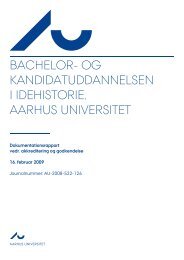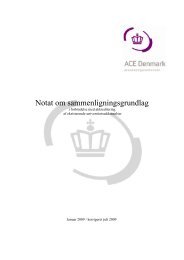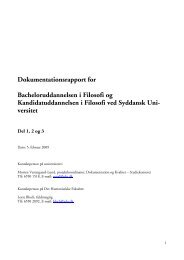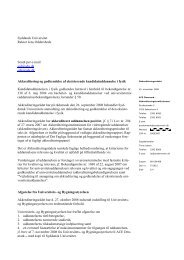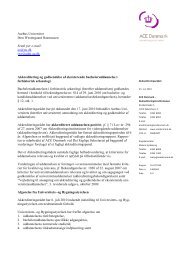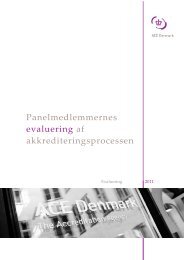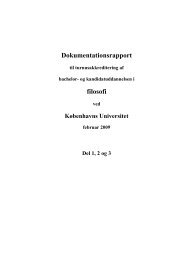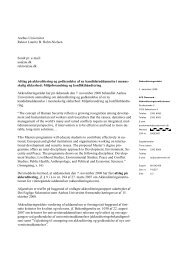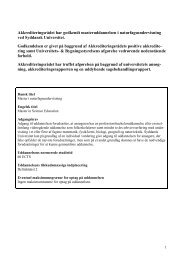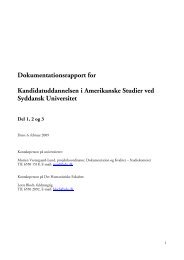- Page 1 and 2:
Akkrediteringsrapport for bacheloru
- Page 3 and 4:
Akkrediteringsrapport for bacheloru
- Page 5 and 6:
Akkrediteringsrapport for bacheloru
- Page 7 and 8:
Akkrediteringsrapport for bacheloru
- Page 9 and 10:
Akkrediteringsrapport for bacheloru
- Page 11 and 12:
Akkrediteringsrapport for bacheloru
- Page 13 and 14:
Akkrediteringsrapport for bacheloru
- Page 15 and 16:
Akkrediteringsrapport for bacheloru
- Page 17 and 18:
Akkrediteringsrapport for bacheloru
- Page 19 and 20:
Akkrediteringsrapport for bacheloru
- Page 21 and 22:
Akkrediteringsrapport for bacheloru
- Page 23 and 24:
Akkrediteringsrapport for bacheloru
- Page 25 and 26:
Akkrediteringsrapport for bacheloru
- Page 27 and 28:
Akkrediteringsrapport for bacheloru
- Page 29 and 30:
Akkrediteringsrapport for bacheloru
- Page 31 and 32:
Akkrediteringsrapport for bacheloru
- Page 33 and 34:
Akkrediteringsrapport for bacheloru
- Page 35 and 36:
Akkrediteringsrapport for bacheloru
- Page 37 and 38:
Bilag 1: Studieordningen for Filoso
- Page 39 and 40:
KAPITEL II Bacheloruddannelser med
- Page 41 and 42:
Stk. 4. Emnet for projektarbejdet v
- Page 43 and 44:
Stk. 7. Såfremt den studerende skr
- Page 45 and 46:
videnskabsteorien samt at give øve
- Page 47 and 48:
§ 25. Studienævnet fastsætter n
- Page 49 and 50:
Side 12 § 35. Prøverne aflægges
- Page 51 and 52:
Der gives én karakter efter 7-trin
- Page 53 and 54:
KAPITEL VI Andre bestemmelser. Side
- Page 55 and 56:
På rektoratets vegne Side 18
- Page 57 and 58:
Fælles for alle bachelorer fra RUC
- Page 59 and 60:
Side 22 Gennem sine valg af projekt
- Page 61 and 62:
Appendiks 2 Kompetencebeskrivelse f
- Page 63 and 64:
Side 26 • begrænset, men tilstr
- Page 65 and 66:
Beskæftigelsesundersøgelse 2007 S
- Page 67 and 68:
Spørgeskema 3 2. (Respondenter i a
- Page 69 and 70:
Spørgeskema 5 2.8 Hvilket område
- Page 71 and 72:
Spørgeskema 7 ! 1 - 20 ansatte ! 2
- Page 73 and 74:
Spørgeskema 9 2.23 Hvad var din m
- Page 75 and 76:
Spørgeskema 11 3.4 Har du opstarte
- Page 77 and 78:
Spørgeskema 13 3.14 Hvad er din m
- Page 79 and 80:
Spørgeskema 15 4. (Ledige responde
- Page 81 and 82:
Spørgeskema 17 5. (Respondenter un
- Page 83 and 84:
Spørgeskema 19 6.5 Hvilket område
- Page 85 and 86:
Spørgeskema 21 6.11 Hvordan var di
- Page 87 and 88:
Spørgeskema 23 6.17 Hvor i landet
- Page 89 and 90:
Spørgeskema 25 7.3 Hvad var efter
- Page 91 and 92:
Spørgeskema 27 8.3 Beskriv med din
- Page 93 and 94:
Spørgeskema 29 9. (Alle:) Overveje
- Page 95 and 96:
Spørgeskema 31 9.8 Hvilken betydni
- Page 97 and 98:
Spørgeskema 33 9.14 Hvilken betydn
- Page 99 and 100:
Spørgeskema 35 11. (Alle:) Efter-
- Page 101 and 102:
Spørgeskema 37 11.11 Hvordan vil d
- Page 103 and 104:
Bilag 3: UBSTs statistik for nyudda
- Page 105 and 106:
Bilag 4: Udviklingsplan for Filosof
- Page 107 and 108:
første år var naturligt nok præg
- Page 109 and 110:
henholdsvis 24 og 12 dobbeltlektion
- Page 111 and 112:
PHIS, http://www.phis.ruc.dk. De fo
- Page 113 and 114:
5. Faggruppens nuværende medlemmer
- Page 115 and 116:
Høst og Søn 2002 (Vincent F. Hend
- Page 117 and 118:
foreløbigt antaget af Johns Hopkin
- Page 119 and 120:
idrag hertil, men de udgør kun en
- Page 121 and 122:
arbejde. Det vil sige, at hovedvæg
- Page 123 and 124:
Strategi 2008 - 2012 Den foreliggen
- Page 125 and 126:
- At gøre instituttet til en udfor
- Page 127 and 128:
kendetegnende for alle uddannelser
- Page 129 and 130:
Inden for to år tager institutlede
- Page 131 and 132:
- Videnskabsstudier Desuden deltage
- Page 133 and 134:
Der oprettes aftagerpaneler for ins
- Page 135 and 136:
har foregået og vil foregå. Især
- Page 137 and 138:
Bilag 6: a) CV og Publikationsliste
- Page 139 and 140:
Erik Bendtsen: ’Temaer i teknolog
- Page 141 and 142:
2006: “Logic of Imperatives”, L
- Page 143 and 144:
Organiserede konferencer (med Marti
- Page 145 and 146:
M. Sc. Claus Festersen Ph.d.-stipen
- Page 148 and 149:
Aksel Haaning Jeg er født i 1959,
- Page 150 and 151:
Pelle Guldborg Hansen 2007-8: Ph.d.
- Page 152 and 153:
New York / London: Automatic Press
- Page 154 and 155:
Lærebogsprisen, 2006 (Dkr 25.000)
- Page 156 and 157:
Publications. 2006 - “Epistemic
- Page 158 and 159:
2004. 2004 - Self-Reference, edite
- Page 160 and 161:
PROFESSIONAL EXPERIENCE February 1
- Page 162 and 163:
Andrea Cantini, Anil Gupta, Melvin
- Page 164 and 165:
Jens Egede Høyrup. Born: Copenhage
- Page 166 and 167:
Klaus Frovin Jørgensen CURRICULUM
- Page 168 and 169:
3/3, 2007 “Skematisering og konst
- Page 170 and 171:
Mihail Larsen Lektor Født 1947. St
- Page 172 and 173:
Jan Berg Olsen, Stig Andur Pedersen
- Page 174 and 175:
Dr. Ursula Renz A) Monographs: 1. D
- Page 176 and 177:
2. From philosophy to criticism of
- Page 178 and 179:
Navn Adresse Telefonnummer E-mail A
- Page 180 and 181:
2004 - Artikler • “Genealogies
- Page 182 and 183:
Pædagogiske aktiviteter Kasper Ris
- Page 184 and 185:
Kombinationer: Antal studerende på
- Page 186 and 187:
Filosofis beskrivelse af kombinatio
- Page 188 and 189:
Filosofis beskrivelse af kombinatio
- Page 190 and 191:
dannelse, teorier om forsteninger,
- Page 192 and 193:
RUC Innovation RUC Innovation blev
- Page 194 and 195:
Bilag 9: Undervisningsmiljøvurderi
- Page 196 and 197:
Indholdsfortegnelse Indledning.....
- Page 198 and 199:
Arbejdsgruppens forslag til priorit
- Page 200 and 201:
Samlet set ønsker Studenterrådet,
- Page 202 and 203:
Teorilokale, bygning P8 Fordele:
- Page 204 and 205:
Store auditorium, bygning 00 Fordel
- Page 206 and 207:
Lille auditorium, bygning 01 Fordel
- Page 208 and 209:
Boghandlen, bygning 01 Fordele: •
- Page 210 and 211:
Auditorium, bygning 15 Fordele: •
- Page 212 and 213:
Teorilokale, bygning 18.2 Fordele:
- Page 214 and 215:
Teorilokale, bygning 27 Fordele:
- Page 216 and 217:
Auditorium, bygning 46 Fordele: •
- Page 218 and 219:
Teorilokale, bygning 25 Fordele:
- Page 220 and 221:
Auditorium, bygning 25 Fordele: •
- Page 222 and 223:
Udearealer Fordele: • Gode rekrea
- Page 224 and 225:
Bilag 1: Skema til UMV Udfyldt af:
- Page 226 and 227:
Bilag 10: 'Handlingsplan for pædag
- Page 228 and 229: Alle fastansatte VIP’ere har plig
- Page 230 and 231: Økonomi / Ressourcer Der er, som t
- Page 232 and 233: Øvrigt Som bilag vedlægges følge
- Page 234 and 235: 5) Der tilbydes 5-6 temaer i adjunk
- Page 236 and 237: Nye obligatoriske spor: 1. Deltagel
- Page 238 and 239: Som noget nyt ved RUC gøres adjunk
- Page 240 and 241: UniPæd og den ansvarlige i institu
- Page 242 and 243: • UniPæd danner ramme om aktivit
- Page 244 and 245: • UniPæd skal sammen med ”Fagd
- Page 246 and 247: ”Studentercentreret undervisning
- Page 248 and 249: Der vil blive lagt vægt på 4 spor
- Page 250 and 251: Der gennemføres en række intervie
- Page 252 and 253: Kortlægning af specialevejledning,
- Page 254 and 255: evillingen skal bruges til udviklin
- Page 256 and 257: Fokus kunne f.eks. være at identif
- Page 258 and 259: UniPæd i 2007 i alt har forbrugt i
- Page 260 and 261: BEMÆRK: Rollen som proces coach er
- Page 262 and 263: Bilag C Informationssøgning - kurs
- Page 264 and 265: Bilag 11: Evalueringsskema til eval
- Page 266 and 267: 4. Synes du undervisningen har kval
- Page 268 and 269: Bilag 12: Oversigt over kurser på
- Page 270 and 271: ved Klaus F. Jørgensen I kursets f
- Page 272 and 273: 7.-12. dobbelttime (efterår 2005):
- Page 274 and 275: Kurser efterår 2005 Filosofihistor
- Page 276 and 277: 3. kursusgang: Introduktion / kapit
- Page 280 and 281: Kendsgerningens historie Vidnesbyrd
- Page 282 and 283: Hobbes, Leviathan. Mange forskellig
- Page 284 and 285: program. Som sådan er Montagues re
- Page 286 and 287: Fra omkring vor tidsregning og frem
- Page 288 and 289: Kurser efterår 2006 Kursus i Filos
- Page 290 and 291: Liah Greenfield, ”How Economics B
- Page 292 and 293: Den teknologifilosofiske debat er b
- Page 294 and 295: those who can talk to their childre
- Page 296 and 297: formulering af sit filosofiske stan
- Page 298 and 299: Videnskabshistorie Kurset giver et
- Page 300 and 301: 5. Taksonomi Dear 2006, kapitel 2,
- Page 302 and 303: Anbefalet litteratur: Theodore Port
- Page 304 and 305: Moderne Metafysik V. Stig Andur Ped
- Page 306 and 307: Bilag 13: Vejlederprofiler
- Page 308 and 309: formel bevisteori. Første halvdel
- Page 310 and 311: (hvem skriver historie, hvornår og
- Page 312 and 313: Vincent F. Hendricks Dr. phil., ph.
- Page 314 and 315: Jeg har udgivet artikler inden for
- Page 316 and 317: Primære vejledningsområder: Logik
- Page 318 and 319: Bilag 14: Roskilde Universitet 2020
- Page 320 and 321: • evalueringen afspejler læringe
- Page 322 and 323: • Roskilde Universitet skal spill
- Page 324 and 325: Den tværfaglige tilgang skal sikre
- Page 326 and 327: • Forskningsgrupperne skal værne
- Page 328 and 329:
uddannelsesprogrammer og ikke afson
- Page 330 and 331:
• Der skal udvikles tilbud om udl
- Page 332 and 333:
• Roskilde Universitet skal vider
- Page 334 and 335:
• ansatte og studerende får hurt
- Page 336:
Bilag 15: Universitets udviklingsko
- Page 359 and 360:
Spørgeskema om undervisningsmiljø
- Page 361 and 362:
Faciliteter Hvordan vurderer du gen
- Page 363 and 364:
Psykosociale forhold Spørgsmål om
- Page 365 and 366:
Er du bekymret for, om du som færd
- Page 367 and 368:
Hvordan synes du generelt, bordene
- Page 369 and 370:
Bacheloruddannelsernes struktur og
- Page 371 and 372:
Det andet overbygningsfag på bache
- Page 373 and 374:
Bilag 18: Centralt aftagerpanel på
- Page 375 and 376:
Bilag 19: Kvalifikationsramme for v
- Page 377 and 378:
Kandidatniveau Viden Færdigheder K
- Page 379 and 380:
Beskrivelser af de ordinære videre
- Page 381 and 382:
Formelle forhold ECTS 90-150 1 Adga
- Page 383 and 384:
Kompetencer Handlingsrummet Samarbe
- Page 385 and 386:
13. januar 2009 Strategi for kvalit
- Page 387 and 388:
esultaterne. Evalueringsskemaet er
- Page 389 and 390:
til enhver tid siddende formand for
- Page 391 and 392:
giver handlingsanvisninger og fasts
- Page 393 and 394:
agencies alike. It is not the inten
- Page 395 and 396:
sammenhæng mellem universitetets f
- Page 397 and 398:
• Indslusningsvejledning: Studie-
- Page 399 and 400:
Akademisk engelsk Kurser og vejledn
- Page 401 and 402:
Svar på de to første dele går ti
- Page 403 and 404:
Der er mange muligheder for at arbe
- Page 405 and 406:
OUT OF THE ARMCHAIR Filosoer fra RU
- Page 407 and 408:
Indholdsfortegnelse Videnskabens na
- Page 409 and 410:
er. Men indtil da håber vi i det m
- Page 411 and 412:
Kristeligt Dagblad | 19.01.2007 | S
- Page 413 and 414:
- Alle ved, at man ikke bliver et b
- Page 415 and 416:
løbet af det sidste halve årti er
- Page 417 and 418:
få lyst til at give igen, når man
- Page 419 and 420:
Han fortæller, at undersøgelser t
- Page 421 and 422:
ed vifte af forskellige måder at s
- Page 423 and 424:
Chicago er privilegeret på dette o
- Page 425 and 426:
Kristeligt Dagblad | 12.02.2007 | S
- Page 427 and 428:
som mange refererer til, når krimi
- Page 429 and 430:
tælle sandheden og erkende de sår
- Page 431 and 432:
lande har underskrevet Rom-statutte
- Page 433 and 434:
Men faktisk er det i det hele taget
- Page 435 and 436:
Weekendavisen | 13.04.2007 | 1. SEK
- Page 437 and 438:
Ligesom Frit Forum, beklagede 1700-
- Page 439 and 440:
Berlingske Tidende | 01.06.2007 | 2
- Page 441 and 442:
te/maskiner eller EPO). Det er en s
- Page 443 and 444:
Der kan ikke herske tvivl om, at de
- Page 445 and 446:
ket forbi. De rummer nemlig både f
- Page 447 and 448:
Information | 25.08.2007 | Refleks
- Page 449 and 450:
"Da melder dommerforeningen ud og s
- Page 451 and 452:
Weekendavisen | 28.09.2007 | 1. SEK
- Page 453 and 454:
USA’s og Storbritanniens grunde.
- Page 455 and 456:
Politiken | 08.12.2007 | Debat/Deba
- Page 457 and 458:
»Selvfølgelig. Hvis man kun har s
- Page 459 and 460:
grundlæggende materiale hentes fra
- Page 461 and 462:
Politiken | 25.01.2008 | Indland |
- Page 463 and 464:
Januar 2008 Kristeligt Dagblad | 29
- Page 465 and 466:
slutninger af det, fordi præmissen
- Page 467 and 468:
Shipping News | 01.03.2008 | Side 4
- Page 469 and 470:
But, as I asked: can the intent of
- Page 471 and 472:
a daily basis on this assumption. F
- Page 473 and 474:
Kristeligt Dagblad | 05.04.2008 | 1
- Page 475 and 476:
Kristeligt Dagblad | 24.05.2008 | 1
- Page 477 and 478:
Weekendavisen | 30.05.2008 | 4 Sekt
- Page 479 and 480:
Undlader man at indgå i moralfilos
- Page 481 and 482:
føjer Ann Tabor, der i sin tid sad
- Page 483 and 484:
handle på. Derfor mener jeg heller
- Page 485 and 486:
Weekendavisen | 27.06.2008 | 2 Sekt
- Page 487 and 488:
tingelser til, hvad der skal forst
- Page 489 and 490:
I oplægget til konferencen hedder
- Page 491 and 492:
ser nogen væsensforskel på kunsti
- Page 493 and 494:
overtage de amerikanske universitet
- Page 495 and 496:
Jyllands-Posten | 24.07.2008 | 1. s
- Page 497 and 498:
Politiken | 09.08.2008 | Debat | Si
- Page 499 and 500:
Det sagde pressen: ”Det er jo det
- Page 501 and 502:
Editorial Boards Erik Bendtsen: Med
- Page 503 and 504:
Jens Høyrup: I 2006 var jeg med ti
- Page 505 and 506:
Straf af krigsforbrydelser, folkedr
- Page 507 and 508:
Bilag 23 Supplement til bilag 6a -
- Page 509 and 510:
S. Petersen, Nyt Nordisk Forlag, K
- Page 511 and 512:
2002 "Higher and Lower Pleasures. D
- Page 513 and 514:
11. 2001 Petersen, T.S.: "Generocen
- Page 515 and 516:
30. 2008 Petersen, T.S.: Godt begyn
- Page 517 and 518:
53. 2008 Hansen, K. & Petersen, T.S
- Page 519 and 520:
84. 1994 Petersen, T.: "Etik og klo
- Page 521 and 522:
Bilag 24 Tværfaglige kompetencebes
- Page 523 and 524:
Der kan skelnes mellem tre forskell
- Page 525 and 526:
TVÆRFAGLIG KOMPETENCEBESKRIVELSE F
- Page 527 and 528:
TVÆRFAGLIG KOMPETENCEBESKRIVELSE F
- Page 529:
TVÆRFAGLIG KOMPETENCEBESKRIVELSE F




